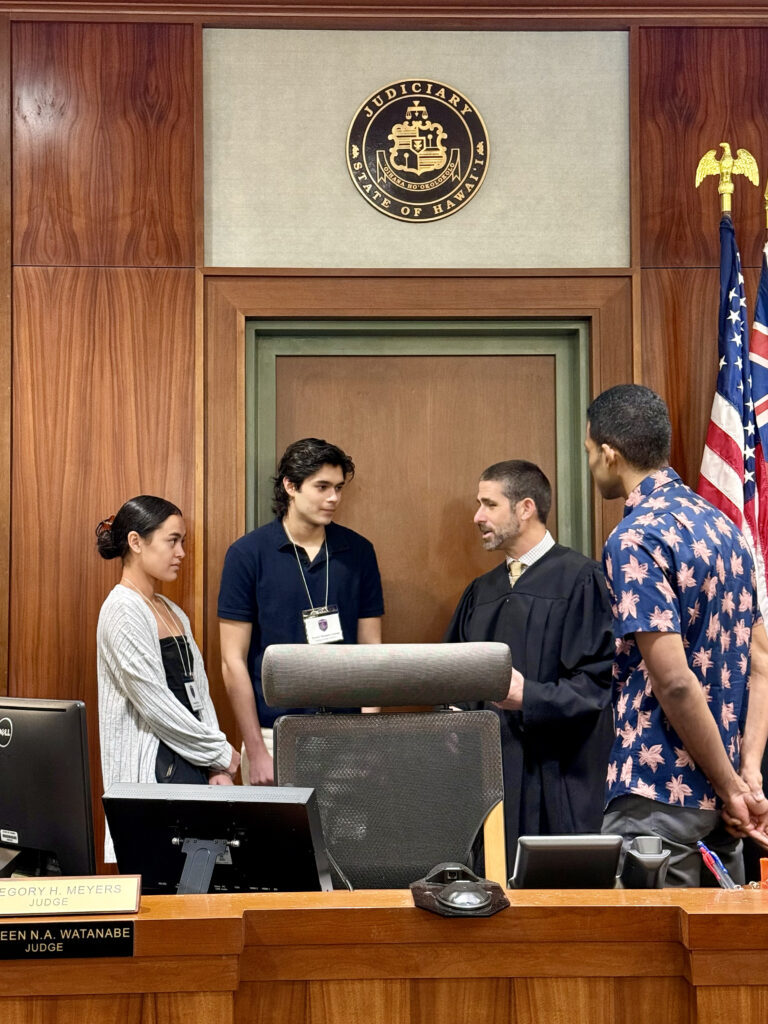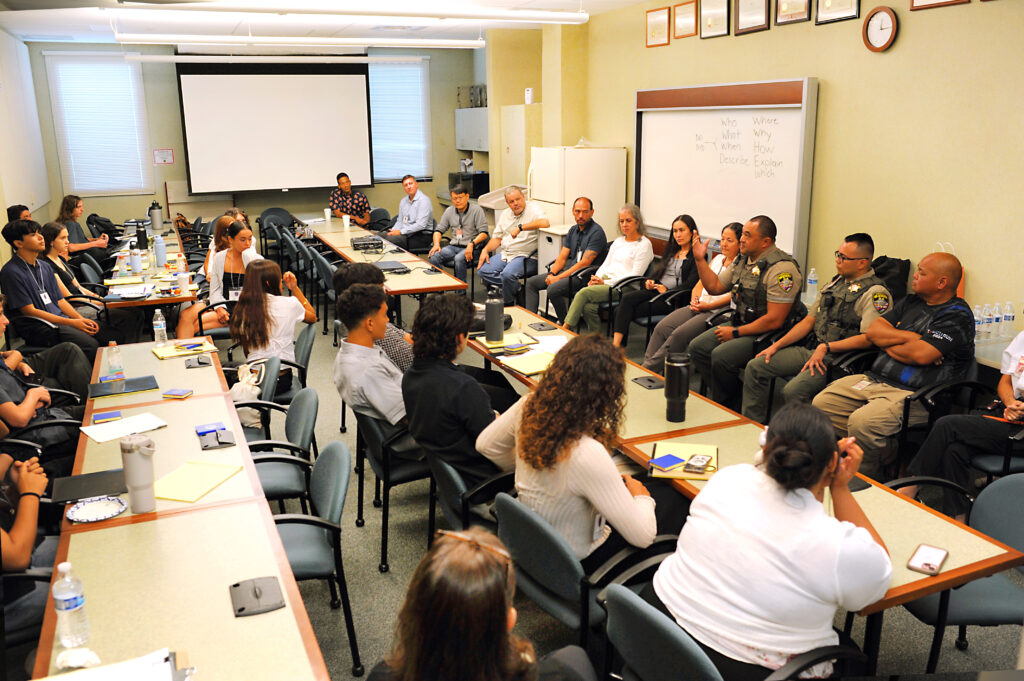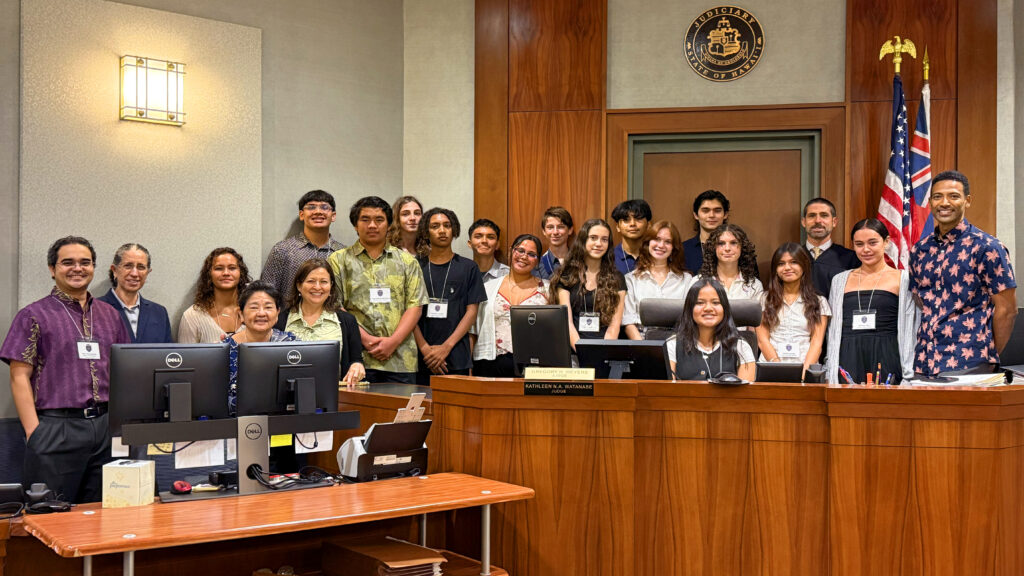


Kauaʻi Law and Justice Academy Inspires Civic Engagement and Legal Learning
LĪHUʻE, Kauaʻi – Sixteen high school students from across the island gathered at Puʻuhonua Kaulike, the Kauaʻi courthouse, from October 7 to 9, 2025, to take part in the Kauaʻi Law and Justice Academy, an intensive, hands-on program designed to build understanding of the legal system, sharpen advocacy and analytical skills, and inspire civic participation.
The Academy was hosted by the Commission to Promote and Advance Civic Education (PACE Commission), in partnership with the Hawaiʻi State Judiciary, the United States District Court for the District of Hawaiʻi, the Hawaiʻi Chapter of the Federal Bar Association, the William S. Richardson School of Law, and the Kauaʻi Bar Association.
Students representing Kapaʻa High School, Kauaʻi High School, Waimea High School, Hawaiʻi Technology Academy, Island School, and Kamehameha Schools Kapālama spent three days immersed in workshops and activities that connected lessons in law and justice to the history, people, and culture of Kauaʻi.
“What made the Kauaʻi Academy special was the way students really dove into the material and experiences to take advantage of the extraordinary resources available to them in their own backyard,” said Richardson Law professor Troy Andrade.
Like the earlier academies held on Maui and Hawaiʻi Island, the Kauaʻi program emphasized the PACE Commission’s mission to create place-based, culturally informed civic education opportunities throughout the islands. By integrating Kauaʻi’s unique heritage and community voices into the curriculum, organizers sought to deepen students’ understanding of how law and civic responsibility intersect with everyday life in Hawaiʻi.
At the heart of the program was a mock trial exercise, a cornerstone of every Law and Justice Academy. Students were introduced to courtroom roles and procedures, learned how to analyze a case file, and formed theories and arguments for trial. They then practiced witness examinations, hearings on motions, and preparing opening and closing arguments under the guidance of judges and attorneys. The program culminated in a mock trial held in the Līhuʻe courthouse, with students presenting their cases before volunteer judges from the Fifth Circuit.
“It was inspiring to see how quickly these high school students from different schools and various backgrounds joined together to form a legal advocacy team,” said District Family Court Judge Gregory Meyers who was instrumental in staging the three-day event. “I give them credit for their willingness to learn, adapt and perform in front of their peers on such short notice. It was particularly gratifying to observe the confidence built by the students throughout the 3-day academy, culminating in their outstanding courtroom presentations.”
Beyond the courtroom, the Academy introduced students to pathways in higher education and public service. Participants met with judges, attorneys, and court staff to learn about careers in the legal field and within the judiciary. They also engaged in discussions about the importance of civic leadership and the responsibilities that come with living in a constitutional democracy.
The program extended beyond the courthouse walls, offering students the chance to explore the deep cultural and historical roots of their island community. On the second day, participants visited the Kauaʻi Museum, where they learned about the island’s heritage and the role of civic institutions in preserving local identity. They then toured Makauwahi Cave with an archaeologist and representative from Grove Farm. Makauwahi Cave is located in Māhāʻulepū, the area featured in the mock trial the students studied. These experiences reinforced one of the Academy’s core lessons: that law and justice do not exist in isolation but are part of a broader story that includes culture, history, and community.
Throughout the three days, volunteers from the PACE Commission and attorneys from the Kauaʻi Bar Association guided the students through mock trial exercises, while Judge Meyers coordinated Fifth Circuit efforts to ensure the event’s success. Donna Kalama, Cissy Farm, Steven Uejio, Prof. Andrade, U.S. Magistrate Wes Porter and Keahe Davis were key organizers of the event. U.S. District Court Judge Micah Smith, Hawaiʻi Supreme Court Justice Lisa Ginoza, and Intermediate Court of Appeals Judge Sonja McCullen were also among the contributors who made presentations and supported the students.
“The Law and Justice Academies give students across our islands a meaningful opportunity to see themselves as an important part of civic life and potential future leaders. Every academy is a reflection of its community. By combining rigorous learning with cultural and historical context, we’re showing students that the principles of justice are not abstract—they live in our shared places and shared responsibility to one another,” Justice Ginoza said.
As the PACE Commission continues to expand the Law and Justice Academy program statewide, the Kauaʻi experience stands as another strong example of the Commission’s vision to promote constitutionally informed, culturally sensitive, and community-based civic education that empowers Hawaiʻi’s next generation of leaders.